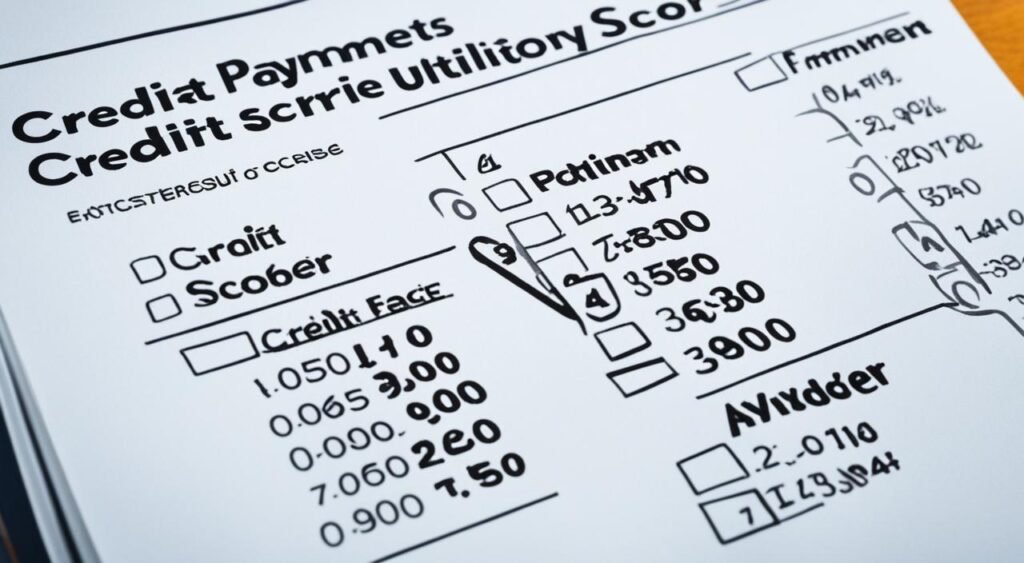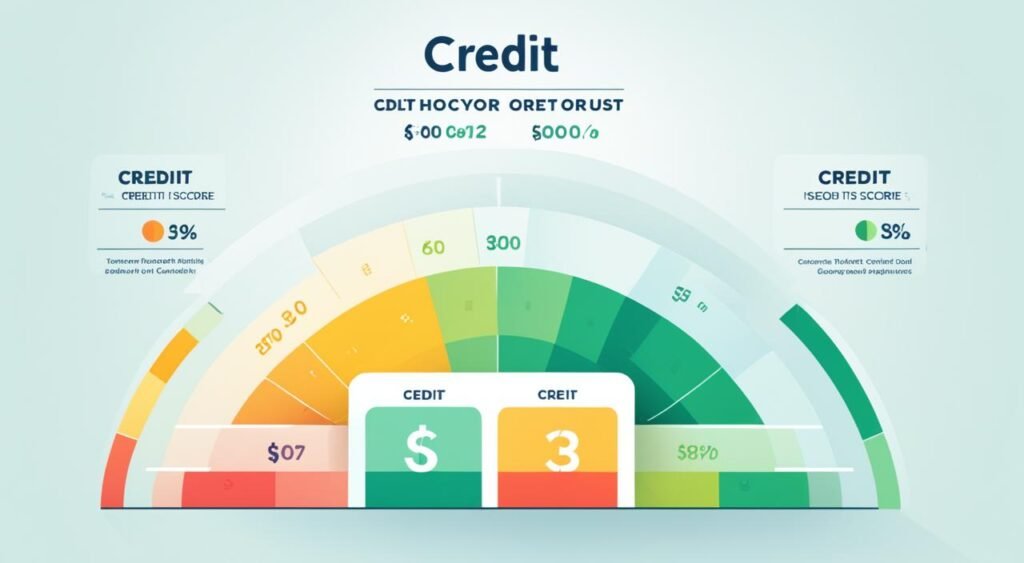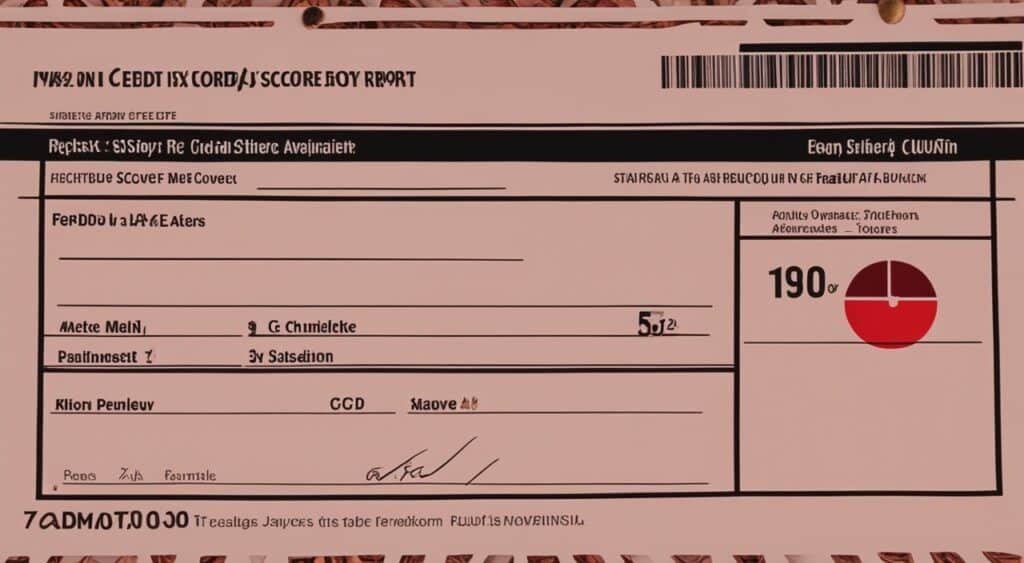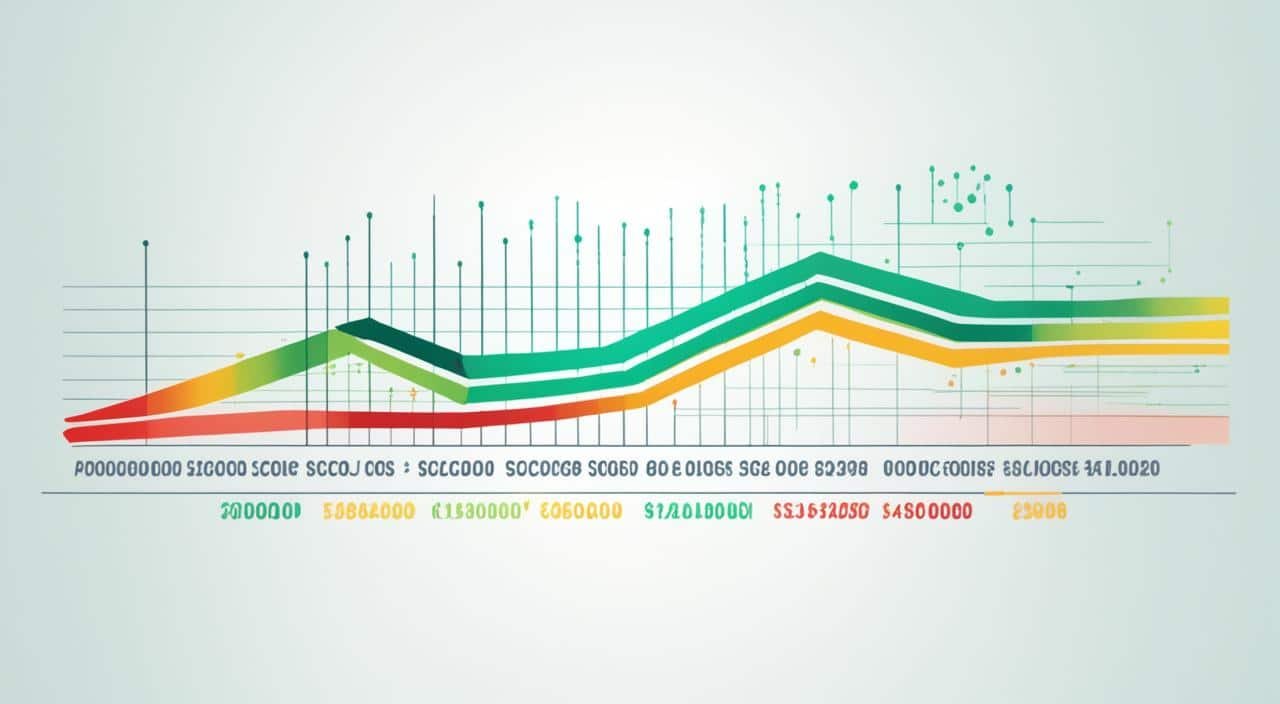What Is A Credit Score And Why Does It Matter?
Your credit score is key to your financial health. It shows how likely you are to pay back loans. Lenders look at it to decide if they should lend you money. Your score comes from your credit reports, which list your payment history and how much credit you use.
There are two main types of credit scores: FICO and VantageScores. FICO is used by most lenders and ranges from 300 to 850. A score between 670 and 739 is good and can get you better loan deals. But, a low score can make getting credit hard or cost more.
Key Takeaways
- Your credit score shows how likely you are to pay back loans, helping lenders decide if they should lend you money.
- FICO and VantageScores are the top credit scoring models, with FICO being the standard.
- A score between 670 and 739 is considered good and can get you better loan terms.
- A low score can make getting credit hard or cost more.
- Your score is based on your credit history, including how you pay and how much credit you use.
Understanding Credit Scores
Understanding your credit score is key to managing your finances. This three-digit number shows how likely you are to pay back debts. It ranges from 300 to 850. A higher score means you’re seen as less risky, making it easier to get loans and credit cards at good rates.
What Is a Credit Score?
Your credit score shows how trustworthy you are with credit. It looks at your payment history, how much you owe, how long you’ve had credit, the types of credit you have, and new credit requests. The FICO and VantageScore models are the most common, with FICO being the standard.
Credit Score Ranges and Ratings
For FICO Scores, a score of 670-739 is “good,” 740-799 is “very good,” and 800 or above is “exceptional.” VantageScores rate a score of 661-780 as “good.” Knowing these ranges helps you understand your financial health and make better credit choices.
| Credit Score Range | FICO Score Rating | VantageScore Rating |
|---|---|---|
| 800 and above | Exceptional | Excellent |
| 740-799 | Very Good | Good |
| 670-739 | Good | Good |
| 580-669 | Fair | Fair |
| 500-579 | Poor | Poor |
| 499 and below | Very Poor | Very Poor |
Knowing about credit score definition, how credit scores work, and the different credit score ranges and ratings is key. It helps you manage your finances better and make smart choices.
Factors Affecting Your Credit Score

Your credit score is key for lenders to check if you’re good with money. Knowing what affects your score helps keep your finances in good shape. The main things that change your credit score are how you pay, how much you owe, how long you’ve had credit, the mix of your credit, and new credit applications.
Payment History
Payment history is the biggest factor, making up 35% of your FICO score. It shows if you pay on time. Paying on time makes you look good to lenders and can raise your score.
Amounts Owed and Credit Utilization
How much you owe and your credit use make up 30% of your score. This means how much of your credit you’re using. Keeping your credit card use low helps your score.
Length of Credit History
How long you’ve had credit is 15% of your score. It looks at how old your credit accounts are. Having accounts for a long time shows you’re good at handling credit.
Credit Mix
Your credit mix, which is 10% of your score, is about the kinds of credit you have. Having different kinds of credit, like cards, loans, and mortgages, is good for your score.
New Credit Inquiries
New credit checks, which are 10% of your score, can lower your score when you apply for credit. But this effect is usually small and short-term, especially if you handle your credit well.
Knowing how these factors affect your score helps you make smart money choices. This way, you can keep your finances strong and get better credit deals later.
Credit Score

A credit score shows how likely someone is to pay back money. It’s a key tool for lenders to check the risk of lending. This credit score overview explains the credit score basics and its importance, role, and impact on finances.
A credit score is a three-digit number between 300 and 850. Higher scores mean a lower risk of not paying back. Lenders look at this score to see if you’ll pay back your debts. They use it to decide on loan approvals, interest rates, and credit limits.
Knowing what affects your credit score is key. Payment history, how much you owe, credit history length, credit mix, and new credit applications matter. Keeping a good credit score means better loan terms and improving your financial health.
“A good credit score is the gateway to financial opportunities, opening doors to lower interest rates, better credit card offers, and greater access to loans.”
In personal finance, a credit score is very important. It affects your financial path. By understanding the credit score basics and its big credit score impact, you can make better choices. This helps you reach your financial goals.
Why Credit Scores are Important

Your credit score is key to your financial health. It affects your ability to get loans, credit cards, and even jobs. A score of 670 or higher means better interest rates and terms, saving you money. But a low score can make getting financing hard and increase your costs.
Qualifying for Loans and Credit Cards
Lenders look at your credit score to see if you’re a good risk. People with high scores are seen as safer borrowers. They’re more likely to get loans and credit cards. A strong credit score also means you can get more credit and better terms.
Interest Rates and Terms
Your credit score impacts your credit options and rates. Those with high scores get lower rates, saving you money over time. A good credit score can also lead to better terms, like longer repayment periods or flexible payments.
“A good credit score can open doors and save you money, while a poor one can make it difficult to achieve your financial goals.”
Keeping a good credit score is vital for your finances. It helps you qualify for loans and credit cards and gets you better rates and terms. This saves you money in the long run.
Checking Your Credit Score

Knowing your credit score is key to good financial health and smart decisions. In the U.S., you can check your credit scores and monitor your credit reports easily through different channels.
Obtaining Your Free Annual Credit Report
AnnualCreditReport.com is a great place to access your credit report and credit score. It’s a government-approved site that gives you free annual credit reports. These reports show your credit score info, like your payment history and how much credit you use.
By checking your credit score and reviewing your credit report often, you can spot mistakes or issues. This helps you fix problems and keep an eye on your credit health. Taking these steps can help you improve your credit score. This makes it easier to get loans, credit cards, and better interest rates.
“Regularly monitoring your credit report and score is a crucial step in maintaining a healthy financial profile.”
Improving Your Credit Score

Having a good credit score is key for your financial health. There are steps you can take to boost your score and keep it strong. Let’s look at three main ways: pay bills on time, cut down credit card debt, and keep a varied credit mix.
Paying Bills on Time
Your payment history is a big part of your credit score. Always pay your bills on time, like credit cards, loans, and utilities. This shows lenders you’re a reliable borrower. Missing a payment can really hurt your score, so stay on top of your bills.
Reducing Credit Card Balances
How much debt you have also matters for your credit score. Try to keep your credit card balances under 30% of your limit. This lowers your credit utilization and shows you’re good with debt.
Maintaining a Good Credit Mix
Having different kinds of credit, like credit cards, loans, and mortgages, can help your score. It shows you can handle various credits well, making you look better to lenders.
By focusing on these strategies – paying bills on time, reducing credit card debt, and keeping a good credit mix – you can improve your credit score. With effort and patience, you can open up better financial doors and enjoy the perks of a strong credit score.
Credit Score Myths and Misconceptions
Many people have wrong ideas about credit scores that can lead to bad financial choices. It’s key to know what really affects credit scores and look for trustworthy sources of info.
One big credit score myth is thinking that closing unused credit cards helps your score. Actually, it can hurt your score by shortening your credit history and lowering your available credit. Also, some believe checking their credit score will hurt it, but this “soft inquiry” doesn’t count.
Another credit score myth is that lenders only look at credit scores when deciding on loans. But, they also check your income, debt, and job history to see if you’re a good borrower.
“Credit scores are complex and often not well understood in personal finance. It’s vital to know the credit score facts from the credit score misinformation to make smart choices about your financial future.”
By knowing the truth about common credit score beliefs, people can work on improving their scores and make better financial choices.
Also Read: Credit Card For Students: Building Credit Early
Conclusion
A credit score is a key financial tool that greatly affects how well you can get credit and loans. It also impacts the loan terms you get and helps you reach your financial goals. It’s important to know the credit score importance summary and keep an eye on your credit health.
By managing your credit score summary well, you can improve your financial success. This means you can get better credit and financing for your goals. A good credit score impact summary leads to more opportunities and lower interest rates. It also boosts your financial health importance.
Credit scores are very important for your financial standing and chances. Knowing what affects your scores and managing your credit well can lead to financial stability. This way, you can meet your financial goals over time.
FAQs
Q: What is a credit score?
A credit score shows how likely someone is to pay back a loan. Lenders look at this score to decide if they should lend money. It’s based on your credit history, like how you’ve paid bills and used credit.
Q: What are the different credit scoring models?
There are two main credit scoring models: FICO and VantageScore. FICO is the most common, used by 90% of top lenders. A good score, between 670 and 739, can get you better loan deals. A low score makes getting credit harder and costs more.
Q: What factors affect a credit score?
Your credit score depends on several things. Payment history is key, making up 35% of a FICO Score. It shows if you pay on time. Other factors include how much you owe, how long you’ve had credit, the types of credit you have, and new credit requests.
Q: Why is a credit score important?
Lenders use credit scores to see if you’re a good borrower. A high score means you’re less likely to not pay back. This affects the loan terms and rates you get.
Q: How can I obtain my credit report and score?
You can get your credit reports and scores from Equifax, Experian, and TransUnion at AnnualCreditReport.com. This site is official and gives you free reports every year.
Q: How can I improve my credit score?
To boost your score, pay bills on time and keep your credit card use low. Also, having a mix of credit types is good.
Q: What are some common myths and misconceptions about credit scores?
Some wrong ideas say closing credit cards helps your score, or that checking your score hurts it. Another myth is that credit scores are the only thing lenders look at.
Source Links
- https://www.myfico.com/credit-education/credit-scores
- https://www.usa.gov/credit-reports
- https://www.experian.com/blogs/ask-experian/credit-education/score-basics/what-is-a-good-credit-score/
